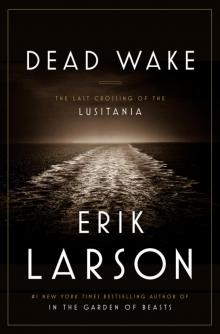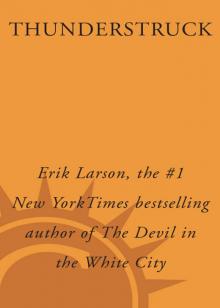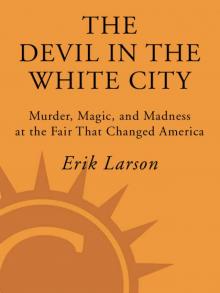- Home
- Erik Larson
In the Garden of Beasts Page 2
In the Garden of Beasts Read online
Page 2
At Randolph-Macon, Dodd promptly got himself into hot water. In 1902 he published an article in the Nation in which he attacked a successful campaign by the Grand Camp of Confederate Veterans to have Virginia ban a history textbook that the veterans deemed an affront to southern honor. Dodd charged that the veterans believed the only valid histories were those that held that the South “was altogether right in seceding from the Union.”
The backlash was immediate. An attorney prominent in the veterans’ movement launched a drive to have Dodd fired from Randolph-Macon. The school gave Dodd its full support. A year later he attacked the veterans again, this time in a speech before the American Historical Society in which he decried their efforts to “put out of the schools any and all books which do not come up to their standard of local patriotism.” He railed that “to remain silent is out of the question for a strong and honest man.”
Dodd’s stature as a historian grew, and so too did his family. His son was born in 1905, his daughter in 1908. Recognizing that an increase in salary would come in handy and that pressure from his southern foes was unlikely to abate, Dodd put his name in the running for an opening at the University of Chicago. He got the job, and in the frigid January of 1909, when he was thirty-nine years old, he and his family made their way to Chicago, where he would remain for the next quarter century. In October 1912, feeling the pull of his heritage and a need to establish his own credibility as a true Jeffersonian democrat, he bought his farm. The grueling work that had so worn on him during his boyhood now became for him both a soul-saving diversion and a romantic harking back to America’s past.
Dodd also discovered in himself an abiding interest in the political life, triggered in earnest when in August 1916 he found himself in the Oval Office of the White House for a meeting with President Woodrow Wilson. The encounter, according to one biographer, “profoundly altered his life.”
Dodd had grown deeply uneasy about signs that America was sliding toward intervention in the Great War then being fought in Europe. His experience in Leipzig had left him no doubt that Germany alone was responsible for starting the war, in satisfaction of the yearnings of Germany’s industrialists and aristocrats, the Junkers, whom he likened to the southern aristocracy before the Civil War. Now he saw the emergence of a similar hubris on the part of America’s own industrial and military elites. When an army general tried to include the University of Chicago in a national campaign to ready the nation for war, Dodd bridled and took his complaint directly to the commander in chief.
Dodd wanted only ten minutes of Wilson’s time but got far more and found himself as thoroughly charmed as if he’d been the recipient of a potion in a fairy tale. He came to believe that Wilson was correct in advocating U.S. intervention in the war. For Dodd, Wilson became the modern embodiment of Jefferson. Over the next seven years, he and Wilson became friends; Dodd wrote Wilson’s biography. Upon Wilson’s death on February 3, 1924, Dodd fell into deep mourning.
At length he came to see Franklin Roosevelt as Wilson’s equal and threw himself behind Roosevelt’s 1932 campaign, speaking and writing on his behalf whenever an opportunity arose. If he had hopes of becoming a member of Roosevelt’s inner circle, however, Dodd soon found himself disappointed, consigned to the increasingly dissatisfying duties of an academic chair.
NOW HE WAS sixty-four years old, and the way he would leave his mark on the world would be with his history of the old South, which also happened to be the one thing that every force in the universe seemed aligned to defeat, including the university’s policy of not heating buildings on Sundays.
More and more he considered leaving the university for some position that would allow him time to write, “before it is too late.” The idea occurred to him that an ideal job might be an undemanding post within the State Department, perhaps as an ambassador in Brussels or The Hague. He believed that he was sufficiently prominent to be considered for such a position, though he tended to see himself as far more influential in national affairs than in fact he was. He had written often to advise Roosevelt on economic and political matters, both before and immediately after Roosevelt’s victory. It surely galled Dodd that soon after the election he received from the White House a form letter stating that while the president wanted every letter to his office answered promptly, he could not himself reply to all of them in a timely manner and thus had asked his secretary to do so in his stead.
Dodd did, however, have several good friends who were close to Roosevelt, including the new secretary of commerce, Daniel Roper. Dodd’s son and daughter were to Roper like nephew and niece, sufficiently close that Dodd had no compunction about dispatching his son as intermediary to ask Roper whether the new administration might see fit to appoint Dodd as minister to Belgium or the Netherlands. “These are posts where the government must have somebody, yet the work is not heavy,” Dodd told his son. He confided that he was motivated mainly by his need to complete his Old South. “I am not desirous of any appointment from Roosevelt but I am very anxious not to be defeated in a life-long purpose.”
In short, Dodd wanted a sinecure, a job that was not too demanding yet that would provide stature and a living wage and, most important, leave him plenty of time to write—this despite his recognition that serving as a diplomat was not something to which his character was well suited. “As to high diplomacy (London, Paris, Berlin) I am not the kind,” he wrote to his wife early in 1933. “I am distressed that this is so on your account. I simply am not the sly, two-faced type so necessary to ‘lie abroad for the country.’ If I were, I might go to Berlin and bend the knee to Hitler—and relearn German.” But, he added, “why waste time writing about such a subject? Who would care to live in Berlin the next four years?”
Whether because of his son’s conversation with Roper or the play of other forces, Dodd’s name soon was in the wind. On March 15, 1933, during a sojourn at his Virginia farm, he went to Washington to meet with Roosevelt’s new secretary of state, Cordell Hull, whom he had met on a number of previous occasions. Hull was tall and silver haired, with a cleft chin and strong jaw. Outwardly, he seemed the physical embodiment of all that a secretary of state should be, but those who knew him better understood that when angered he had a most unstatesmanlike penchant for releasing torrents of profanity and that he suffered a speech impediment that turned his r’s to w’s in the manner of the cartoon character Elmer Fudd—a trait that Roosevelt now and then made fun of privately, as when he once spoke of Hull’s “twade tweaties.” Hull, as usual, had four or five red pencils in his shirt pocket, his favored tools of state. He raised the possibility of Dodd receiving an appointment to Holland or Belgium, exactly what Dodd had hoped for. But now, suddenly forced to imagine the day-to-day reality of what such a life would entail, Dodd balked. “After considerable study of the situation,” he wrote in his little pocket diary, “I told Hull I could not take such a position.”
But his name remained in circulation.
And now, on that Thursday in June, his telephone began to ring. As he held the receiver to his ear, he heard a voice he recognized immediately.
CHAPTER 2
That Vacancy in Berlin
No one wanted the job. What had seemed one of the least challenging tasks facing Franklin D. Roosevelt as newly elected president had, by June 1933, become one of the most intransigent. As ambassadorial posts went, Berlin should have been a plum—not London or Paris, surely, but still one of the great capitals of Europe, and at the center of a country going through revolutionary change under the leadership of its newly appointed chancellor, Adolf Hitler. Depending on one’s point of view, Germany was experiencing a great revival or a savage darkening. Upon Hitler’s ascent, the country had undergone a brutal spasm of state-condoned violence. Hitler’s brown-shirted paramilitary army, the Sturmabteilung, or SA—the Storm Troopers—had gone wild, arresting, beating, and in some cases murdering communists, socialists, and Jews. Storm Troopers established impromptu prisons and torture stations in baseme
nts, sheds, and other structures. Berlin alone had fifty of these so-called bunkers. Tens of thousands of people were arrested and placed in “protective custody”—Schutzhaft—a risible euphemism. An estimated five hundred to seven hundred prisoners died in custody; others endured “mock drownings and hangings,” according to a police affidavit. One prison near Tempelhof Airport became especially notorious: Columbia House, not to be confused with a sleekly modern new building at the heart of Berlin called Columbus House. The upheaval prompted one Jewish leader, Rabbi Stephen S. Wise of New York, to tell a friend, “the frontiers of civilization have been crossed.”
Roosevelt made his first attempt to fill the Berlin post on March 9, 1933, less than a week after taking office and just as the violence in Germany reached a peak of ferocity. He offered it to James M. Cox, who in 1920 had been a candidate for president with Roosevelt as his running mate.
In a letter laced with flattery, Roosevelt wrote, “It is not only because of my affection for you but also because I think you are singularly fitted to this key place, that I want much to send your name to the Senate as American Ambassador to Germany. I hope much that you will accept after talking it over with your delightful wife, who, by the way, would be perfect as the wife of the Ambassador. Do send me a telegram saying yes.”
Cox said no: the demands of his various business interests, including several newspapers, compelled him to decline. He made no mention of the violence wracking Germany.
Roosevelt set the matter aside to confront the nation’s worsening economic crisis, the Great Depression, which by that spring had put a third of the nation’s nonagricultural labor force out of work and had cut the gross national product in half; he did not return to the problem until at least a month later, when he offered the job to Newton Baker, who had been secretary of war under Woodrow Wilson and was now a partner in a Cleveland law firm. Baker also declined. So did a third man, Owen D. Young, a prominent businessman. Next Roosevelt tried Edward J. Flynn, a key figure in the Democratic Party and a major supporter. Flynn talked it over with his wife “and we agreed that, because of the age of our small children, such an appointment would be impossible.”
At one point Roosevelt joked to a member of the Warburg family, “You know, Jimmy, it would serve that fellow Hitler right if I sent a Jew to Berlin as my ambassador. How would you like the job?”
Now, with the advent of June, a deadline pressed. Roosevelt was engaged in an all-consuming fight to pass his National Industrial Recovery Act, a centerpiece of his New Deal, in the face of fervent opposition by a core group of powerful Republicans. Early in the month, with Congress just days away from its summer adjournment, the bill seemed on the verge of passage but was still under assault by Republicans and some Democrats, who launched salvos of proposed amendments and forced the Senate into marathon sessions. Roosevelt feared that the longer the battle dragged on, the more likely the bill was to fail or be severely weakened, in part because any extension of the congressional session meant risking the wrath of legislators intent on leaving Washington for summer vacation. Everyone was growing cranky. A late-spring heat wave had driven temperatures to record levels throughout the nation at a cost of over a hundred lives. Washington steamed; men stank. A three-column headline on the front page of the New York Times read, “ROOSEVELT TRIMS PROGRAM TO HASTEN END OF SESSION; SEES HIS POLICIES MENACED.”
Herein lay a conflict: Congress was required to confirm and fund new ambassadors. The sooner Congress adjourned, the greater the pressure on Roosevelt to choose a new man for Berlin. Thus, he now found himself compelled to consider candidates outside the bounds of the usual patronage choices, including the presidents of at least three colleges and an ardent pacifist named Harry Emerson Fosdick, the Baptist pastor of Riverside Church in Manhattan. None of these seemed ideal, however; none was offered the job.
On Wednesday, June 7, with the congressional adjournment just days away, Roosevelt met with several close advisers and mentioned his frustration at not being able to find a new ambassador. One of those in attendance was Commerce Secretary Roper, whom Roosevelt now and then referred to as “Uncle Dan.”
Roper thought a moment and threw out a fresh name, that of a longtime friend: “How about William E. Dodd?”
“Not a bad idea,” Roosevelt said, although whether he truly thought so at that instant was by no means clear. Ever affable, Roosevelt was prone to promise things he did not necessarily intend to deliver.
Roosevelt said, “I’ll consider it.”
DODD WAS ANYTHING BUT the typical candidate for a diplomatic post. He wasn’t rich. He wasn’t politically influential. He wasn’t one of Roosevelt’s friends. But he did speak German and was said to know the country well. One potential problem was his past allegiance to Woodrow Wilson, whose belief in engaging other nations on the world stage was anathema to the growing camp of Americans who insisted that the United States avoid entangling itself in the affairs of foreign nations. These “isolationists,” led by William Borah of Idaho and Hiram Johnson of California, had become increasingly noisy and powerful. Polls showed that 95 percent of Americans wanted the United States to avoid involvement in any foreign war. Although Roosevelt himself favored international engagement, he kept his views on the subject veiled so as not to impede the advance of his domestic agenda. Dodd, however, seemed unlikely to spark the isolationists’ passions. He was a historian of sober temperament, and his firsthand understanding of Germany had obvious value.
Berlin, moreover, was not yet the supercharged outpost it would become within the year. There existed at this time a widespread perception that Hitler’s government could not possibly endure. Germany’s military power was limited—its army, the Reichswehr, had only one hundred thousand men, no match for the military forces of neighboring France, let alone the combined might of France, England, Poland, and the Soviet Union. And Hitler himself had begun to seem like a more temperate actor than might have been predicted given the violence that had swept Germany earlier in the year. On May 10, 1933, the Nazi Party burned unwelcome books—Einstein, Freud, the brothers Mann, and many others—in great pyres throughout Germany, but seven days later Hitler declared himself committed to peace and went so far as to pledge complete disarmament if other countries followed suit. The world swooned with relief. Against the broader backdrop of the challenges facing Roosevelt—global depression, another year of crippling drought—Germany seemed more an irritant than anything else. What Roosevelt and Secretary Hull considered the most pressing German problem was the $1.2 billion that Germany owed to American creditors, a debt that Hitler’s regime seemed increasingly unwilling to pay.
No one appeared to give much thought to the kind of personality a man might need in order to deal effectively with Hitler’s government. Secretary Roper believed “that Dodd would be astute in handling diplomatic duties and, when conferences grew tense, he would turn the tide by quoting Jefferson.”
ROOSEVELT DID TAKE Roper’s suggestion seriously.
Time was running out, and there were far more pressing matters to be dealt with as the nation sank ever more deeply into economic despair.
The next day, June 8, Roosevelt ordered a long-distance call placed to Chicago.
He kept it brief. He told Dodd: “I want to know if you will render the government a distinct service. I want you to go to Germany as ambassador.”
He added, “I want an American liberal in Germany as a standing example.”
It was hot in the Oval Office, hot in Dodd’s office. The temperature in Chicago was well into the nineties.
Dodd told Roosevelt he needed time to think and to talk with his wife.
Roosevelt gave him two hours.
FIRST DODD SPOKE with university officials, who urged him to accept. Next he walked home, quickly, through the intensifying heat.
He had deep misgivings. His Old South was his priority. Serving as ambassador to Hitler’s Germany would leave him no more time to write, and probably far less, than did his obligations
at the university.
His wife, Mattie, understood, but she knew his need for recognition and his sense that by this time in his life he should have achieved more than he had. Dodd in turn felt that he owed something to her. She had stood by him all these years for what he saw as little reward. “There is no place suitable to my kind of mentality,” he had told her earlier that year in a letter from the farm, “and I regret it much for your sake and that of the children.” The letter continued, “I know it must be distressing to such a true and devoted wife to have so inept a husband at [a] critical moment of history which he has so long foreseen, one who can not fit himself to high position and thus reap some of the returns of a life of toilsome study. It happens to be your misfortune.”
After a brisk bout of discussion and marital soul-searching, Dodd and his wife agreed he should accept Roosevelt’s offer. What made the decision a little easier was Roosevelt’s concession that if the University of Chicago “insists,” Dodd could return to Chicago within a year. But right now, Roosevelt said, he needed Dodd in Berlin.
At two thirty, half an hour late, his misgivings temporarily suppressed, Dodd called the White House and informed Roosevelt’s secretary that he would accept the job. Two days later Roosevelt placed Dodd’s appointment before the Senate, which confirmed him that day, requiring neither Dodd’s presence nor the kind of interminable hearing that one day would become commonplace for key nominations. The appointment attracted little comment in the press. The New York Times placed a brief report on page twelve of its Sunday, June 11, newspaper.

 Lethal Passage: The Story of a Gun
Lethal Passage: The Story of a Gun In the Garden of Beasts: Love, Terror, and an American Family in Hitler's Berlin
In the Garden of Beasts: Love, Terror, and an American Family in Hitler's Berlin Dead Wake: The Last Crossing of the Lusitania
Dead Wake: The Last Crossing of the Lusitania The Splendid and the Vile
The Splendid and the Vile Thunderstruck
Thunderstruck Isaac's Storm: A Man, a Time, and the Deadliest Hurricane in History
Isaac's Storm: A Man, a Time, and the Deadliest Hurricane in History In the Garden of Beasts
In the Garden of Beasts The Devil in the White City
The Devil in the White City